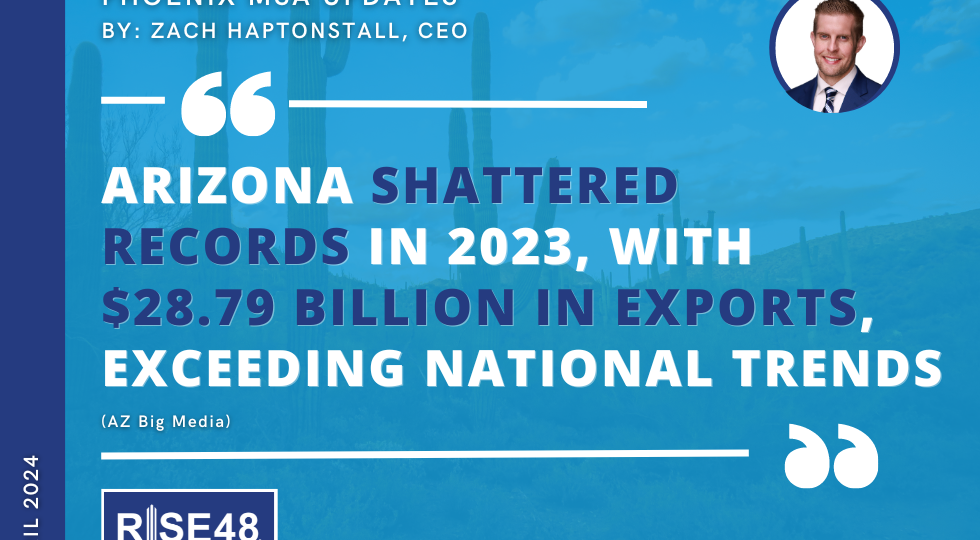
Phoenix Fuels Arizona's Economic Growth
Arizona’s economy is thriving, and the Phoenix MSA is at the heart of this growth. From a booming job market to multi-billion dollar investments in cutting-edge industries, the region boasts a dynamic landscape packed with economic opportunity. This blog post explores the key factors propelling Arizona’s success, highlighting the positive impact on job creation, housing demand, and overall prosperity.
Robust Employment Market: A Magnet for Talent
The Valley’s employment landscape is buzzing with activity, making it increasingly attractive to both job seekers and businesses. Scottsdale, Arizona stands out as a favorable environment for these job seekers. A recent study by CashNetUSA placed Scottsdale as the 5th best city in the nation for finding entry-level work without a degree, boasting a low ratio of 1.69 non-degree holders for every entry-level opening.

This study by CashNetUSA utilized data from both the U.S. Census Bureau and Indeed.com. Their methodology focused on the ratio of high school graduates to available entry-level positions, using this to rank cities based on job competitiveness for those without college degrees (AZ Big Media).
This positive job outlook is attracting an influx of new residents, creating sustained demand for housing within the Phoenix MSA. As businesses thrive and create more jobs, individuals will continue to relocate to the region.
Mega Events and Tourism: Booming Economic Impacts
The Phoenix MSA’s ability to host major events consistently injects billions of dollars into the local economy.
The NCAA Final Four brought significant economic benefits to Arizona. With record-breaking attendance, out-of-state visitors were a major driver of spending. While the official economic impact study is still pending, the Common Sense Institute (CSI) estimated to generate between $250 and $300 million in economic impact for the region thanks to substantial spending across various sectors: hotels, meals, transportation, tickets, etc. Locals also contributed to the economic activity, with total spending projected in the hundreds of millions of dollars.
Other estimates from the CSI report include a $20 billion contribution of the sports and tourism sector to Arizona’s GDP in 2024, $12.7 billion in direct sales by Arizona’s hotels, casinos, and performance venues in 2024, an estimated $15 million in additional sales tax revenue for state and local governments, and direct employment of over 320,000 people in the effected sectors.
Phoenix’s success in hosting the event has put the city on the radar for future mega-events. Positive feedback from the NCAA, proven ability to handle logistics, and the city’s attractiveness as a destination all bode well for securing future Final Four events (Phoenix Business Journal).
Government Support and Investment: Driving Industry Growth
Federal and state-level support of specific industries is pivotal to the Phoenix MSA’s economic success. The CHIPS and Science Act represents a significant investment in the semiconductor industry, with Arizona poised to become a hub for chip manufacturing.
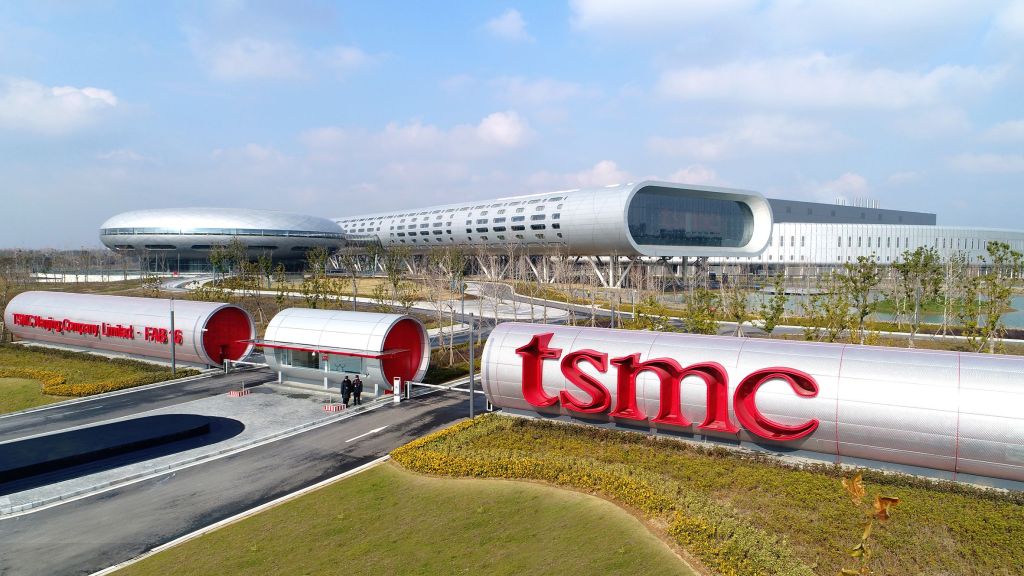


TSMC’s commitment is a prime example. The company is scaling its Arizona investment from $40 billion to $65 billion. Along with two existing fabs, they plan to build a third facility that will produce the world’s most cutting-edge 2 nanometer chips. TSMC’s fabs are expected to begin production in 2025 and 2028, ultimately employing over 6,000 workers. TSMC’s presence has attracted additional semiconductor suppliers to Arizona.
TSMC’s award is the second largest under the CHIPS Act, following Intel’s $40 billion+ package. Both companies are crucial for strengthening domestic semiconductor manufacturing capabilities. TSMC will earmark $50 million of its award for workforce training programs in Arizona. Partnerships exist with local universities and community colleges to develop skilled semiconductor technicians.
Arizona Senator Mark Kelly, a key figure in passing the CHIPS Act, praised the award and its implications for Arizona’s economic growth and national security. Phoenix Mayor Kate Gallego echoed the sentiment, emphasizing the long-term benefits for the region.
“The ripple effects from both TSMC’s expansion and the federal government’s investment will go far beyond our city limits — they will shape the trajectory of our entire region, create thousands of high-wage jobs to support families, and fuel strong economic growth for generations to come,” said Mayor Kate Gallego (Phoenix Business Journal).
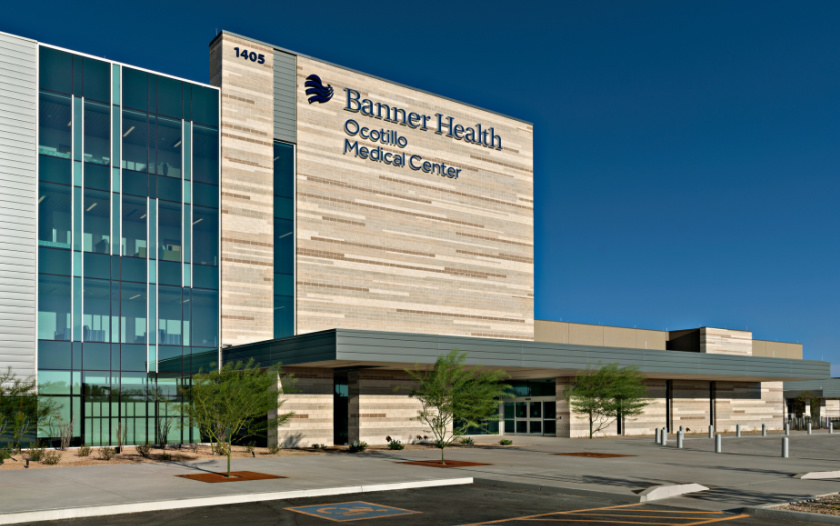


Powerhouse Industries in Arizona
Healthcare stands as the backbone of Arizona’s economy, employing a massive workforce and serving the needs of its aging population. Companies like Banner Health play a crucial role in providing both healthcare services and thousands of jobs. According to IBISWorld’s recent Arizona State Economic Profile, Banner Health employed 28,310 people in 2023. This sector shows no signs of slowing down, bolstering Arizona’s overall economic well-being. Common Sense Institute Arizona (CSIA) predicts that the healthcare division will grow to $44 billion by 2033.
Another thriving industry in Arizona is the state’s hospitality and tourism sectors. Cience data indicates that Arizona is home to 709 hospitality and leisure companies. World-class resorts, restaurants, and unique attractions in the Valley welcome millions of visitors each year, creating a ripple effect of jobs and economic activity. According to the CSIA, $13.7 billion in revenue was generated within the hospitality, leisure, and tourism sectors in 2022 and the industry employed 347,500 people in the same year, representing 11% of Arizona’s workforce.
Arizona has shed its “cowboy town” image, becoming a hub for advanced manufacturing. The state attracts tech leaders in electronics, aerospace, and defense, adding a high-tech edge to its economic landscape. The CSIA indicates that this sector contributes to about 9% of the state’s Gross Domestic Product and 6% of total employment. These major manufacturing companies provide not only valuable products but also thousands of well-paying jobs that boost Arizona’s economy.
The information technology boom hasn’t bypassed Arizona. The state’s growing IT sector, fueled by finance and e-commerce giants, translates into thousands of new jobs. The latest Information Technology Council (ITI) data indicates that Arizona has around 204,000 technology jobs. This is a 3.5% increase in this workforce compared to the previous year. This tech influx positions Arizona as a modern player on the economic stage (AZ Big Media).
Overall, Arizona’s mix of industries creates a powerhouse economy. The combination of traditional strengths like modern tech hubs, and consistently growing sectors like healthcare and tourism provides the perfect recipe for success in Arizona.
Arizona Exports Set New Record
Arizona shattered export records in 2023, exceeding both the previous year and national trends. Governor Katie Hobbs highlighted Arizona’s $28.79 billion in exports, representing a 5.5% growth during a time when overall U.S. exports declined. This success signifies Arizona’s growing economic influence.
Arizona is a top performer across several export sectors. The state ranks high in aerospace, electrical equipment, semiconductors, and metal ores. Key export partners include Mexico, Canada, the Netherlands, China, and the UK.
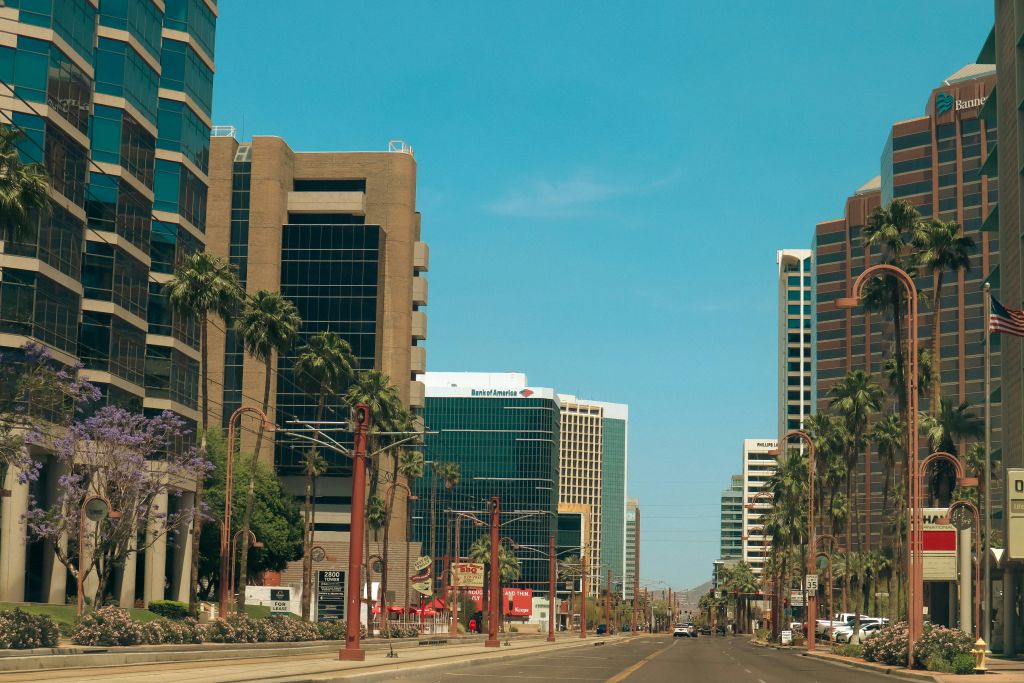


The Arizona Commerce Authority (ACA), led by Sandra Watson, attributes the export surge to the state’s expanding manufacturing base, particularly among small and medium-sized enterprises. The ACA’s strategic focus on tech manufacturing sectors like batteries and semiconductors positions Arizona for continued export growth.



Federal Investments Fuel Arizona’s Clean Energy Growth
On April 5th, Arizona leaders gathered at the Clean Economy and Community Impact Summit to discuss how federal investments from the Inflation Reduction Act and Bipartisan Infrastructure Law are transforming the state’s economy.
Senator Mark Kelly underscored the creation of thousands of jobs in emerging clean energy sectors, emphasizing that many positions don’t require traditional degrees. He sees Arizona becoming an innovation hub thanks to these investments.
Mayor Regina Romero, Governor Stephen Roe Lewis of the Gila River Indian Community, and other leaders also participated in the event alongside Mitch Landrieu, former Senior Advisor to the President and Infrastructure Coordinator. Landrieu emphasized that over $90 billion in public and private investments have poured into Arizona’s clean tech sector, positioning the state as a leader in addressing the climate crisis while creating economic opportunities.
Arizona is at the forefront of the clean energy revolution, driven by federal investment and collaboration between government, industry, and community leaders. This surge in investment fuels job creation, economic growth, and an overall more sustainable future for the state.
XNRGY Breaks Ground at Gateway
Xnrgy, a Montreal-based climate systems manufacturer, has broken ground on its massive new U.S. headquarters in southeast Mesa. This move, years in the making, follows a shift from initial plans and represents a $300 million investment at Gateway East, a development near the Phoenix-Mesa Gateway Airport. Once fully operational, Xnrgy’s 1 million-square-foot facility could employ up to 2,000 people.
Wais Jalali, Xnrgy’s founder and CEO, cited the development’s scale and speed as key reasons Gateway East was chosen. Their ambitious plans include partnering with LG Energy Solution on its nearby battery manufacturing complex. Jalali aims to relocate to Arizona when operations begin, anticipated by the first quarter of 2025.
Xnrgy’s arrival marks a major milestone for Gateway East. The company’s focus on innovation across sectors like data centers and life sciences aligns with the development’s goals and the region’s economic ambitions. As the first tenant at Gateway East, Xnrgy sets a high bar for the project, promising significant job creation and bolstering the area’s reputation as a hotbed for industrial development (Phoenix Business Journal).
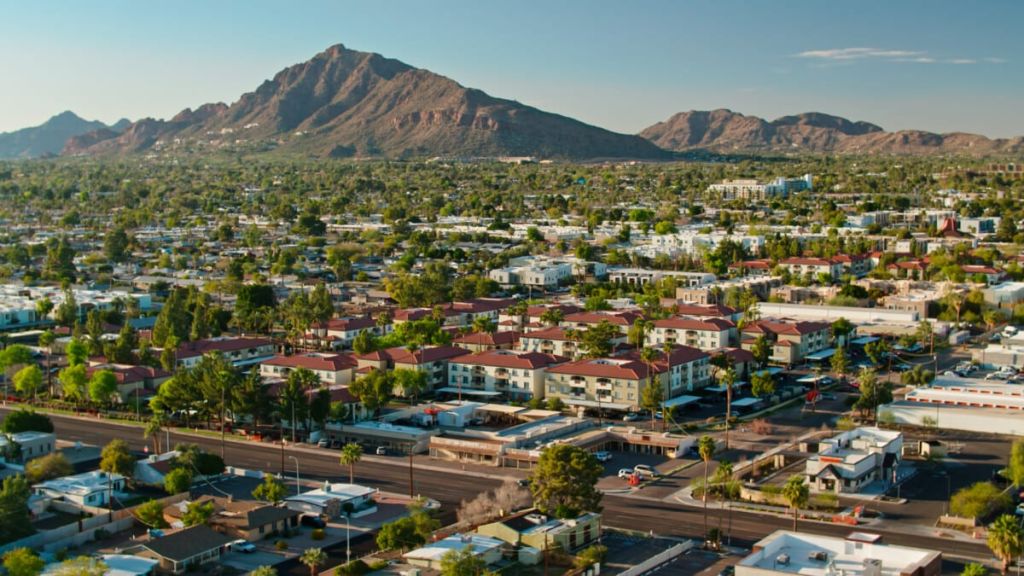


Content at Scale Chooses Scottsdale for Growth
Content at Scale, a leading AI content creation company, has announced its new headquarters in Scottsdale, Arizona’s Raintree Corporate Center. This strategic move brings together top talent from across the globe and signifies a major investment in operations and community engagement.
Justin McGill, CEO, and Julia McCoy, President, emphasize Scottsdale’s innovation-focused environment and their commitment to pushing the boundaries of AI applications. The new 6,000 square-foot office will generate up to 100 jobs, attracting AI engineers, marketing experts, and more.
Scottsdale Mayor David Ortega welcomes the move, highlighting the city’s tech-focused ecosystem. Content at Scale’s integration aligns with the region’s economic goals, promising to boost the area’s reputation in AI-driven content creation. The company’s leadership values community involvement, recently joining the Arizona Tech Council and seeking local partnerships.
Arizona’s unique blend of industries, strategic investments, and government support fosters a vibrant and resilient economy. The state’s strong track record in attracting major businesses, hosting mega-events, and exporting goods globally positions it for continued growth. As a hub for innovation and a desirable location for businesses and residents alike, the future looks bright for Arizona’s economic landscape. The expanding job market, thriving industries, and rising exports all paint a picture of an Arizona truly on the rise.
Since 2019, Rise48 Equity has completed over $2.19 Billion+ in total transactions, and currently has $1.75 Billion+ of Assets Under Management located in Phoenix and Dallas. All of the company’s assets under management are managed by Rise48 Equity’s vertically integrated property management company, Rise48 Communities.

